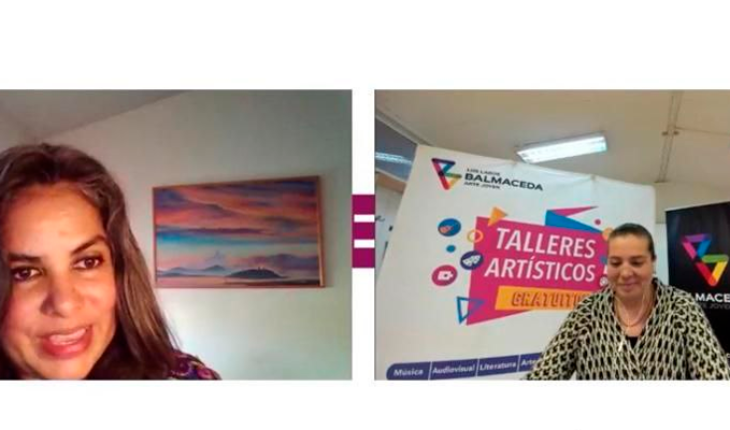Morelia, Michoacán.- ‘City, Culture and Imagination’, was the name of the virtual dialogue that the Government of Morelia through the Secretariat of Municipal Culture carried out to combine the culture visions of Unesco Mexico, British Council, Argentina, Chile, El Salvador, Colombia, Guadalajara, Mérida, and CDMX, in the face of the current coVID19 landscape worldwide, so they reported it in a statement.
In the framework of the 479th anniversary of the city, since Morelia was born for the first time, this virtual meeting that was part of the initiative #ResiliArt, unesco international movement, in which the impact of the COVID19 pandemic was raised in the artistic and cultural sector, while at the time making visible key issues such as the restrictions faced by artists as a result of confinement measures; the financial consequences, the health crisis for cultural professionals, as well as the measures that governments, international organizations and the private sector, among other actors, can implement to support artists during and after this crisis, recalled Cardiela Amézcua Luna, Municipal’s Secretary of Culture.
“On behalf of Professor Raúl Morón Orozco, I appreciate the presence of everyone in this first virtual dialogue to talk about the city, culture and imagination and how we will solve these new paradigms to relate and have access to the production and enjoyment of culture in the public spaces of Morelia in harmony and harmony with this Latin American thought of human, social, cultural, environmental and economic rights”, were the words of welcome of Amézcua Luna.
During his speech, Frédéric Vacheron, UNESCO’s representative in Mexico, commented, since the emergence of the pandemic, the cultural sector was among the most affected, but at the same time, it has been among the most active sectors to mobilize in this context, which is why UNESCO launched the programme #Resiliart a few weeks ago. “Technology has transformed the creative value chain of culture; gaps remain with the connection of different areas and sectors. We will have to work on 5 policies to generate current change, such as supporting artists to work with technological tools, training for artists in terms of communication, and promoting digital cooperation among artists, to name a few.”
Maria García Holley of the British Council highlighted that cultural rights are extremely important, and among global changes, she has noticed a lot of potential to work digitally. “We need to work to have a more inclusive and diverse sector, to celebrate all the artistic forms of directors bodies and contexts.”
Paulino Espinoza of El Salvador, noted: “In my country like everyone else, we go through a very particular situation, we have great challenges but also opportunities. The cultural spaces are closed at this time which has meant a loss of work. Recovering spaces that are overrun by other activities and organizing our own is always a challenge in this country. I find it very important what SeCultura is doing since Morelia with the inter-connection, this situation of isolation has forced us to be creative and find other ways to communicate.”
Gabriela Redondo cultural manager of Argentina, was another of the participants who emphasized the importance of not normalizing confinement, “we are not isolated from nature, we must work in community from science and art. Let us pay to reflect our body and our social space.”
Diana Ledesma Undersecretary of Culture of Cali, Colombia, a pioneering country of the cultural industry in Latin America, explained: “We are the first
Morelia City Council
city to present a project of cultural and creative industries, and we have generated transformations in our policies. We are in an age to adapt, stop and think about what we can improve and maintain, and the process of virtuality that allows me to be in this way in Morelia”.
Francisca Paris, cultural manager of Chile’s Lakes region, shared in the dialogue, “COVID19 brought us throughout Latin America a rethink of how to guarantee citizens’ cultural rights and we have emphasized creative promotion and access to culture, as well as freedom of creation. Balmaceda Arte Joven is a corporation where we work with young people from 14 to 29 years, and during the last month we have re-raised our entire strategy to provide that access to culture, although there are people who are not on the internet and that we are also interested, to bring our prograthose sectors. Besides, now is the time to tell the authority that it should invest in culture and not cut off its budget, because it is what citizens need, that identity, because culture forms critical thinking.”
From Frutillar, Chile, Ciudad Creativa, was José Feureisen, who commented, in Latin America a mobilizing engine of social developments have been the artists, and at this time will not be the exception, “we must transgress, that is, mobilize the horizons of visibility of our society”.
Dolores Hernández de Guadalajara, city of the Mexican Network of Creative Cities, contributed, “I am the director of international relations of the city, and I attend to the creative and cultural community. The issue of the pandemic has shown flaws in the system, some of which we already saw in creative communities who did not have access to tools and have a security of their businesses and access to the eligible government.”
De Mérida, city of the Network of Creative Cities of Mexico, was present Irving Berlin, who said, the mediatization of culture facilitates some actions, but inhibits some things, at the time of remember, the physical presence is necessary because not all cultural efforts are transmitted in the same way.
Eleno Guzmán, independent cultural manager of Guadalajara, was another of the virtual guests who mentioned, after the cancellation of the international agenda, networks must be woven between states for the flow of the economy. And perform management from coherence and with community thinking. “In addition, projects should be built that dialogue with the public space and the people who inhabit them.”
Liliana López Borbón, independent manager of CDMX, externó, you have to think about the production of the city in the face of the hybrid world that is being generated, “to produce a space is also to reproduce moral norms, you have to re-imagine the city”.
Antonio Godoy, head of the Secretariat of Mobility and Public Space, was another guest who brought his experience on the public space, focused on the cultural aspect, an axis that addressed the virtual dialogue.
Finally, Amézcua Luna recalled, in the Government of Morelia of Raúl Morón Orozco is followed a methodology of community cultural development, idea of community capable of rethinking and re-habiting, which will be discussed in the other three dialogues that will be held in this Month of May by the networks of the SeCultura.





